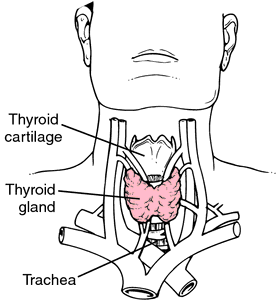thyroid
(redirected from ectopic thyroid)Also found in: Dictionary, Thesaurus, Encyclopedia.
thyroid
[thi´roid]Thyroid crisis is a serious event that can be fatal if not brought under control. All of the body processes are accelerated to dangerously high levels. The pulse may rise to 200 beats per minute, and there is concurrent rise in the respiratory rate. The temperature control center loses control, bringing about a rapid and steady increase in body temperature. Pulmonary edema and congestive heart failure can also occur.
Treatment is aimed at correction of the hyperthyroidism, control of the symptoms, and prevention of further crisis by treating the underlying cause. Medications are employed to block synthesis of thyroid hormones, block their release, and inhibit conversion of triiodothyronine to thyroxine. plasmapheresis. plasma exchange, or hemodialysis may be necessary to remove the hormones from the circulation.
Supportive care includes administration of oxygen and measures to control hyperthermia, such as the use of ice packs or a hyperthermia blanket. Intravenous hydration is important to prevent shock. The use of glucocorticoids is associated with improved survival rates. propranolol, sympatholytics, and guanethidine are often used, as well as other medications that treat symptoms.
Diagnostic tests for thyroid disorders include radioimmunoassay for T3, T4, and thyroid-stimulating hormone (TSH), free thyroxine serum concentration, and free thyroxine index (FTI). These and other thyroid function tests can be distorted by preparations and foods containing iodine, and by oral contraceptives, phenytoin (Dilantin), and several other drugs. The thyroid scan is useful in detecting nodules and active thyroid tissue and, combined with radioactive iodine uptake, measures the ability of the thyroid gland to take in ingested iodine.
Persons who received radiation to the head and neck as children are at higher than normal risk for development of thyroid abnormalities. Of these disorders about one-third are carcinomas of the thyroid. Other problems related to radiation early in life include adenomas and other malignant and benign tumors, hypo- and hyperthyroidism, and thyroiditis. The American Thyroid Association suggests periodic laboratory testing and physical assessment of persons at high risk in order to detect these abnormalities when they are more amenable to treatment.

Secretion of thyroid hormones is regulated by the hypothalamus-pituitary-thyroid control system. Internal environmental conditions, such as low thyroid hormone and norepinephrine serum levels, or external factors, such as cold and stress, activate the hypothalamus, which secretes thyrotropin-releasing hormone (TRH). This hormone acts on the pituitary gland and brings about the release of thyroid-stimulating hormone (TSH). The TSH then stimulates the release of thyroid hormones such as T3 and T4 from the thyroid gland. When sufficient levels of serum thyroxine and other thyroid hormones have been reached, there is negative feedback to the hypothalamus and TRH is no longer secreted. See also hypothyroidism and hyperthyroidism.
thy·roid
(thī'royd),thyroid
(thī′roid′)thyroid
adjective Relating to the thyroid gland nounthy·roid
(thī'royd)Thyroid
Patient discussion about thyroid
Q. Anyone know if there is a connection between Fibromyalgia and your Thyroid gland? I have Fibromyalgia and I read that if your diagnosed with this you can have Thyroid problems also. If anyone knows out there please inform me. Many thanks.
http://thyroid.about.com/cs/fibromyalgiacfs/a/fibrothyroid.htm
Q. Is there any natural herb for a sluggish thyroid My uncle is suffering with thyroid for the past 8 months and the treatment he underwent is not successful. Is there any natural herb for a sluggish thyroid?
Q. I was told to have my thyroid test and now after the result they have told me to go for MRI I am 23 years old lady……I was told to have my thyroid test and now after the result they have told me to go for MRI……..and I know one of my friend had same type of symptoms and after thyroid test she was on her medicines and now she is well…they say it may be fibromyalgia or sclerosis …why they want me to go for MRI…..there seems to be something serious?